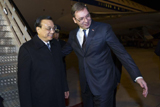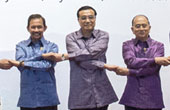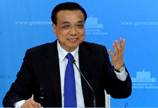Backgrounder: Greater Mekong Subregion Summit
BEIJING - Chinese Premier Li Keqiang is scheduled to attend the fifth Greater Mekong Subregion (GMS) Summit in the Thai capital of Bangkok.
The GMS Economic Cooperation Program was started in 1992 by the six countries sharing the Mekong River -- Cambodia, China, Laos, Myanmar, Thailand and Vietnam. It aims to link the six countries through improvement of infrastructure, thus promoting trade and investment, and stimulating economic growth.
The summit meeting is the supreme decision-making organ of the GMS mechanism and is held once every three years, with the six member nations playing host in turn according to the alphabetic order of the country names.
At the first GMS Summit held in Phnom Penh, Cambodia in 2002, the heads of government of the GMS countries endorsed the first 10-year Strategic Framework (2002-2012) as the "key means through which closer economic cooperation and prosperity will be achieved" in pursuit of the primary goals of GMS cooperation to fulfill the region's vast potential, lift people from poverty and promote sustainable development for all.
At the second GMS Summit held in Kunming, Yunnan Province, China, in 2005, GMS heads of government adopted the Kunming Declaration, reaffirming the goals and objectives of the GMS Program, with "connectivity, competitiveness and community" being laid down as the building blocks for achieving the GMS vision.
At the third GMS Summit held in Vientiane, Laos in 2008, GMS leaders endorsed the Vientiane Plan of Action for GMS Development for 2008-2012 that aimed to spur growth, reduce poverty, promote social development and enhance environmental protection in the subregion.
At the fourth GMS Summit held in Nay Pyi Taw, Myanmar, in 2011, themed "Beyond 2012: Towards a New Decade of GMS Strategic Development Partnership," the summit endorsed a joint declaration -- the Nay Pyi Taw Declaration, with a new 10-year GMS Strategic Framework (2012-2022) signed by GMS leaders.
Under the theme "Committed to Inclusive and Sustainable Development in the GMS", the fifth GMS summit will pass a leaders' declaration, which aims to promote a more open and inclusive partnership for the GMS economic cooperation.
The fifth summit will also provide a strong impetus for the sub-regional cooperation by identifying 92 priority investment projects and passing an investment framework plan for 2014-2018.
In addition, a regional railway alliance and an assessment report on regional transportation strategy for 2006-2015 will be discussed.
Related Stories
Li Keqiang meets Kazakh counterpart in Astana 2014-12-14 20:11
Li Keqiang pledges trust and cooperation with Serbia PM 2014-12-11 14:07
Li Keqiang meets Malaysian prime minister 2014-11-10 16:30
Premier Li Keqiang visits Germany, Russia, Italy 2014-11-08 21:33
Li Keqiang calls for global cooperation against Ebola 2014-10-22 09:02
Remarks by H.E. Li Keqiang Premier of the State Council of the People's Republic of China At the First Plenary Session of the Tenth ASEM Summit 2014-10-17 22:12
Premier Li Keqiang promotes innovation in Moscow speech 2014-10-15 09:15
Background





